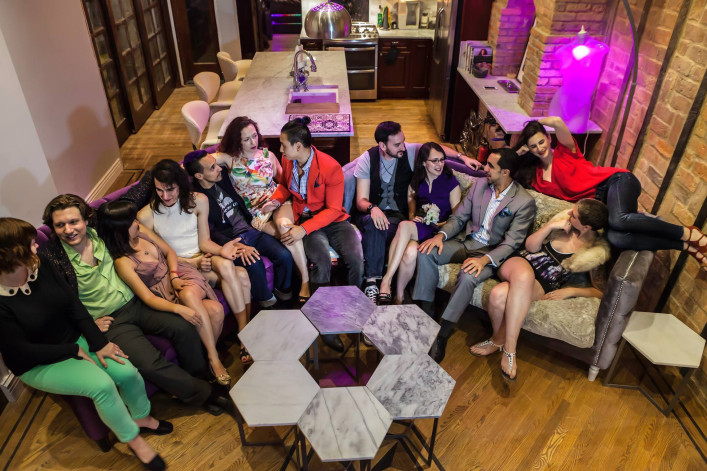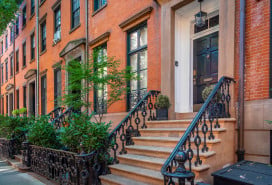Polyamory in the city: What it's like to live in a home dedicated to non-monogamy

Living with a roommate who’s in a relationship can be a challenge—sometimes the partner becomes an unwanted third tenant, or gets into screaming matches (or hookup sessions) that you can’t help but witness. So one might expect that co-habitating with someone who is polyamorous—that is, a person who practices non-monogamy, and engages in, or is interested in engaging in, intimate relationships with more than one person—would be exponentially more complicated. But according to the folks at Hacienda Villa, a building in Bushwick that houses people who identify as poly, life is far more orderly—and less salacious—than many would believe.
Leon Feingold, a lawyer as well as the broker for the building, says that Hacienda came about when a developer and member of the community asked him to rent the property and specifically seek out polyamorous tenants. The decision generated plenty of publicity, often from journalists who thought the building would be, essentially, a “sex house,” Feingold says.
He clarifies that actually, Hacienda is a sex-positive, intentional community, and most of the tenants are not in relationships with each other. “Many people have one or more outside partners, but in-house hookups are pretty rare,” Feingold says. After all, he notes, “The world is our oyster—there are millions of people in NYC.”
Demystifying the community
Hacienda Villa is an impressive space, comprising 15 rooms across three floors. Each floor is its own apartment, and has its own lease with the owner. There is also an event space in the basement for hosting educational talks and documentary screenings, two outdoor spaces, and a backyard Jacuzzi and gazebo. Feingold notes that there is no requirement that residents be poly, “or anything other than respectful of others,” he says. To ensure this, new residents undergo a month-long trial period to get to know their roommates and see if they are the right fit.
Kenneth Play is a sex educator and co-founder of Hacienda Villa, as well as a resident, and he agrees that respect is crucial to life in the house. Tenants are strongly encouraged to find sexual relationships outside the home, because “that’s not what the house is about,” he says. “We promote and create a sex positive community for Brooklyn and New York at large.”
The rules of engagement
Because of the amount of people living in Hacienda—as well as friends and partners who may be visiting—Play says that it was important for residents to establish certain ground rules, one of which is to keep spaces “date-ready,” meaning clean and tidy. Roommates might not respond well to being told to pick up after themselves, Play says, “but if you’re keeping it date-ready, then everyone wants to contribute because it benefits everyone else.”
Frank and direct communication is also key: Play says that at Hacienda, you won’t find any passive-aggressive sticky notes on the fridge. “We don’t hold hidden resentment,” he says. “If you hold onto something for more than 48 hours without speaking up, you forfeit your right to be angry.”
Feingold says that people in more conventional living arrangements can benefit from adopting Hacienda’s house rules, too. “The hallmark of polyamory is open and honest communication,” he says. “All relationships work better when you have that.”

Other house guidelines help to establish boundaries. For instance, everyone is required to take off their shoes when they enter the home, which Play says reminds people “to be mindful of the space. You don’t just let loose.” Setting such a tone is essential, he says, given that Hacienda often hosts parties and events that draw up to 200 guests.
The house rules don't mean the environment is staid and sedate: a resident named Anna Bella wrote an essay about Hacienda for BUST, which begins with her overhearing a roommate’s 11 am spanking session.
Among the roommates, though, Feingold says that “most people are really good with boundaries. They set living agreements where everyone chimes in with what makes sense. The whole thing is a democracy.”
To help facilitate a sense of community, one resident initiated weekly dinners, where members check in with each other and share what’s going on in their lives. If this sounds like the ritual of a wholesome, all-American family, you’re not far off: Play explains that they “intentionally create a better living experience for each other. I know that my family inside the house knows what’s going on with me and cares about me, which is unique in New York.”
The real estate
The building itself is unique, too. Given Hacienda’s amenities—which include a cleaning service, and household supplies like toilet paper built in—Play acknowledges they're fairly privileged: “This would not ordinarily be in our income class, but because we pool our resources together, we enjoy a higher level of luxury.” Hacienda's developer invested in the property with the goal of pioneering a modern intentional community, Play says. The price range for rooms is from $800 to $1750 per month, and tenants think of it as membership fees rather than rent.
Feingold says that his goal is to make people aware of what polyamory really is, and Hacienda Villa is one piece of that. “A lot of people think their way is the only way, but there are workable alternatives to monogamy,” he says. Polyamory is “perhaps the most natural way for humans to connect. Think about how many people you love. But we are taught that if you don’t find that one person you’re going to spend your life with, you’re a failure.”
And as a sex positive, intentional community, Hacienda hosts educational events that introduce a wider audience to a more open-minded approach to sexuality, whether it's a class about bondage or a screening of UnSlut: A Documentary Film, a movie that draws attention to the problem of sexual shaming in the U.S.
The reality, Feingold says, is that ethical non-monogamy is possible. (See Feingold speak more on the subject here.) Play agrees, saying that Hacienda’s tenants practice “responsible hedonism. We love to party and have fun, but we put mindfulness into everything we do.”
Feingold points out that Hacienda Villa is "a living space first and foremost," and avoiding in-house relationships helps preserve that. "It’s not that everyone’s not attractive and fun and sexy," he says, but at the end of the day, "it's really just a home."
What differentiates Hacienda is that elsewhere in NYC, "people who are single have tons of sex but they don't necessarily do it openly and honestly," Feingold says. "The way that people in our community do it is much more open and responsible."
That policy of radical honesty may be why, when Feingold and Play describe the house’s culture, it sounds much more organized and disciplined that one might imagine. After all, Play notes, “The more freedom we have, the more responsibility we have.”
If this appeals, you may be in luck—Feingold says that he’s starting to show another property, a four-floor house with ten bedrooms, that will also become an intentional community.
**This story originally ran on February 10, 2016.**
Related:
Video: go inside Bushwick's polyamorous house
Does the new communal living trend actually make NYC more affordable?


























